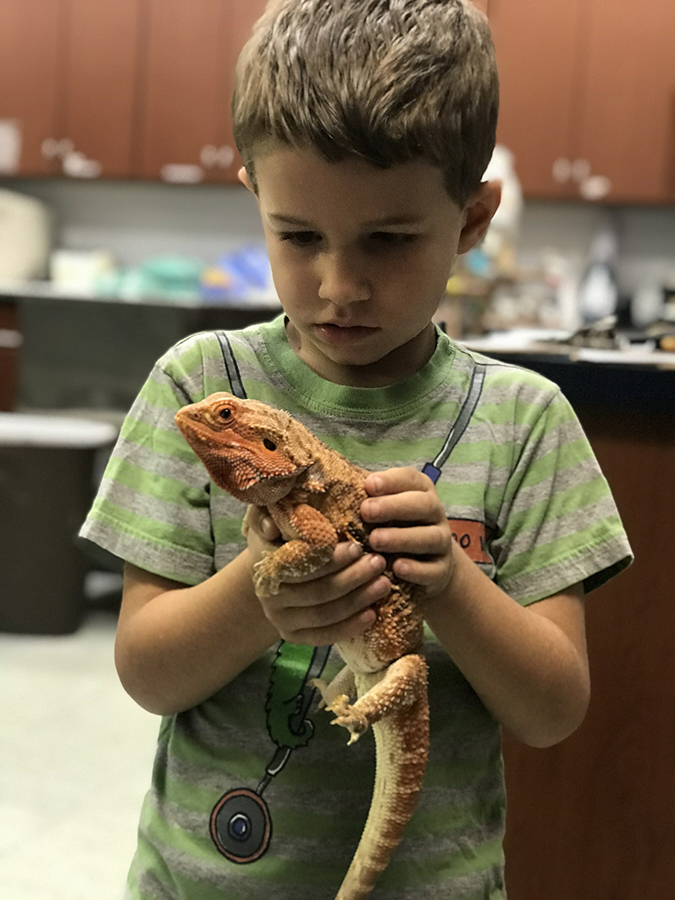
Breakthrough drugs that can save the lives of thousands of diabetic cats, new approaches to help veterinarians and pet owners recognize and treat illnesses unique to French bulldogs, and how to better care for bearded dragons, America’s most popular pet reptile, are just a sample of the more than 800 continuing education sessions that will be offered at the 41st annual Veterinary Meeting & Expo (VMX). Presented by the North American Veterinary Community (NAVC), VMX is the largest global veterinary conference and sets the direction each year for the $104 billion animal health industry. This forum for the latest advances and innovations in animal health will be held January 13 -17, 2024 in Orlando, Florida.
“VMX is the world’s most comprehensive veterinary conference. As the first veterinary conference of the year, it is where remarkable advances are announced and the newest lifesaving techniques are presented,” said Dana Varble, DVM, CAE and NAVC Chief Veterinary Officer. “The global conference attracts the most distinguished veterinary leaders who will share and teach exciting breakthroughs taking place today across the industry. VMX 2024 will look at new medications, many designed specifically for animals, and how technology is transforming how we diagnose and treat animals. It’s a very exciting and promising time to be in veterinary medicine.”
VMX 2024 will be led by world-renowned animal healthcare experts who are available for interviews. Look for more sessions and presenters who will be highlighted this month. See the VMX 2024 Full Program for session dates and times.
Audrey Cook, DVM, professor of small animal internal medicine at Texas A&M University, Diplomate of both the American and European Colleges of Veterinary Internal Medicine and a recognized specialist in feline medicine through the American Board of Veterinary Practitioners.
Breakthroughs in managing feline diabetes in America’s most popular pet. From the veterinarian’s perspective, feline diabetes is a very treatable disease – but for the pet owner, it’s not so simple. According to Dr. Cook, one in 250 cats is diabetic, and one in 10 cats will be euthanized at the time of diagnosis. Studies suggest that less than two-thirds of cats diagnosed with this condition are still alive after three months. Dr. Cook predicts that thousands of cats will live longer and better lives, thanks to breakthroughs in treatment options for feline diabetes in the form of two newly FDA-approved drugs that replace insulin injections with a simple pill or liquid to manage blood sugar levels.
“The mortality rate of feline diabetes is so high not because of the disease but because pet owners do not feel they can provide the care their cats need to live with diabetes,” said Cook. “We’re massively excited about the huge impact two new game-changing oral treatment options will have on our feline patients. We now have the option to simply give a pill or put some liquid medicine on the cat’s food once a day. No more scary needles and regimented schedules. Even more important, with these drugs, there is essentially zero risk of cats experiencing clinical hypoglycemia!”
Aida Vientós-Plotts, DVM, PhD, DACVIM (Small Animal Internal Medicine), assistant professor of small animal internal medicine, and the co-founder and co-director of The BREATHE Clinic at the University of Missouri.
Frenchies Rule! Now What? – An Internist’s Guide to Troubleshooting the Most Popular Breed in the U.S. Dr. Vientós-Plotts will conduct a session about common diseases affecting the most popular dog breed in the United States – French bulldogs, lovingly known as “Frenchies.” Particularly, Dr. Vientós-Plotts will be highlighting a group of respiratory and gastrointestinal diseases often considered “normal” in these dogs. She will teach veterinarians what to look for and how to treat French bulldogs and other breeds so they can breathe better, swallow easier and improve their overall health and wellbeing.
“Brachycephalic, or flat-nosed breeds like French bulldogs, face many health and respiratory issues due to their signature flat snouts and are susceptible to a variety of conditions, including pneumonia, digestive disorders and hiatal hernias, many of which are intimately interrelated,” said Vientós-Plotts. “While behaviors like snoring, spitting up or regurgitating food may be typical in French bulldogs and other brachycephalics, they are not normal and may represent more serious conditions. Learning how to identify and address those conditions as early as possible may result in longer, happier and healthier lives.”
Stacey Leonatti Wilkinson, DVM, Diplomate ABVP (Reptile & Amphibian), adjunct assistant professor at North Carolina State University College of Veterinary Medicine and owner and head veterinarian at the Avian and Exotic Animal Hospital of Georgia.
Myth Busters! Top 5 Common Myths From Bearded Dragon Keepers and How to Address Them. Dr. Leonatti Wilkinson will debunk the most common myths about the most popular reptile pets in the country from what they should eat (no, they should not be eating 50 crickets a day) to how to keep them hydrated and avoid “tail rot.” Wilkinson will set the record straight about these popular reptiles and help other professionals relay the best information to the owners of these unique pets.
“Bearded dragons are by far the most common reptile pets in captivity. We often see multiple in a day in our practice where we treat only exotic pets. Because of this, the care requirements and veterinary medicine for this species is constantly advancing,” said Wilkinson. “When it comes to reptiles, it all depends on husbandry. The animal’s health is directly related to proper lighting, temperatures, humidity, caging, diet, supplements, etc. It is not as simple as putting a premade diet in a bowl and taking them outside to use the bathroom. These things are important every day of that reptile’s life, and they have to get them started right and be conscientious of everything they are doing for their pet all the time.”
Set to a veterinary-style World’s Fair backdrop, this year’s “Show of Shows” theme will offer attendees more than 1,000 hours of continuing education and feature exhibits on the latest in animal healthcare products and diagnostics from more than 600 companies and organizations from around the world in the award-winning VMX Expo Hall. The Expo Hall will also feature headlining entertainment, events and activities, including a carousel, a live miniature horse and carnival games.
About the NAVC
The North American Veterinary Community (NAVC) is a nonprofit organization dedicated to supporting and advancing veterinary professionals worldwide. The world’s leading provider of veterinary continuing education, NAVC delivers essential training, tools and resources for veterinary professionals to stay abreast of advances in animal medicine and provide the best medical care for animals everywhere. Through its commitment to innovation and excellence, the NAVC has developed a diverse portfolio of products and services, including educational events, headlined by VMX, the world’s largest, most comprehensive continuing education conference and launchpad for new products and innovations within the veterinary industry; a robust digital platform for virtual learning and engagement; the veterinary industry’s largest and award-winning portfolio of trade publications; and an advocacy arm which unites the veterinary community and pet lovers. The NAVC was founded in 1982 and is headquartered in Orlando, Florida. Since 2017, the NAVC has been recognized as one of the Top Workplaces by the Orlando Sentinel. To learn more about the NAVC’s products and brands, visit https://navc.com. To see our schedule of upcoming events, visit https://navc.com/calendar/.
SOURCE North American Veterinary Community


Bulloch Lifestyle
Downtown Live Concert Series This Thursday: Papa Sol

Chattooga Local News
ARC Selections Chickamauga Battlefield Connector Trail for Funding in Walker County

Bulloch Public Safety
05/01/2024 Booking Report for Bulloch County

Chattooga Schools
GNTC to hold 2024 Spring Commencement Ceremony May 2

Bulloch Public Safety
04/09/2024 Booking Report for Bulloch County

Bulloch Public Safety
04/08/2024 Booking Report for Bulloch County

Bulloch Public Safety
04/22/2024 Booking Report for Bulloch County

Bulloch Public Safety
04/15/2024 Booking Report for Bulloch County

Bulloch Public Safety
04/10/2024 Booking Report for Bulloch County








